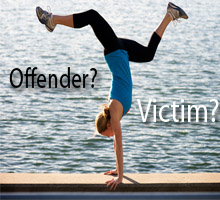 The debates in the UK media on the Jane Clough case are another confirmation of the urgency to rebalance justice as proposed in conclusions to chapters 6 and 8 in Rights for Victims of Crime – irvinwaller.org.
The debates in the UK media on the Jane Clough case are another confirmation of the urgency to rebalance justice as proposed in conclusions to chapters 6 and 8 in Rights for Victims of Crime – irvinwaller.org.
The stark horror of what happened to Jane Clough confirms – and not just in hindsight – the importance of providing the victim with the right and means to debate their concerns for their safety in courts of justice before an accused person is released on bail. http://www.lancashiretelegraph.co.uk/archive/2011/06/30/Barrowford+%28barrowford%29/9114868.Account_of_Lancashire_nurse_killer_s_two_bail_hearings_revealed/
It is nonsense to expect the crown prosecutor to defend the interests of victims in their safety. The ¨crown¨ prosecutor represents the Queen – not the victims of crime. So for victims of crime to have justice in the court of justice and not just cry out for it on the steps of justice – after the horrific facts – requires victims to have standing with representation by their own lawyer in the courts of justice.
In 1985, every government of the world resolved at the UN General Assembly to prevent violence and implement measures to protect basic human rights for victims of crime. Unfortunately, governments have not universally made the shift to which they agreed.
Victims of crime in Anglo-American jurisdictions such as Canada, the UK and the USA have fallen behind countries such as Belgium, France and Germany where victims not only have a right to be represented by lawyers but those lawyers may be remunerated by the government when the victim has insufficient funds.
The ¨traditional¨ excuse by the defenders of the ¨traditional¨ Anglo-American system has been that the adversarial system is better than the continental system. Though they have never been able to provide scientific evidence in support of this argument, that debate is no longer relevant because countries such as Canada and the UK on the one hand and France on the other agreed to the Rome Statute for the International Criminal Court that shows how the right to protection, representation and participation for victims can be protected while allowing the accused to have their rights within an adversarial system.
The EU made comprehensive efforts to implement measures to respect to the human rights for victims of crime in 2002. They even had an implementation timetable – looking good. The EU encouraged an independent and scientific evaluation five years after the target dates for implementation had passed. Among many government failures to meet basic human rights for victims of crime, they recommended such obvious balancing of justice ¨The role of the victim throughout the criminal justice process should be respected and recognised as equal to that of the accused.¨
They continued in the same breath that the EU ¨Framework Decision is legally binding and it is the responsibility of each Member State to ensure that all articles are implemented.¨
So how about it? But not just in the UK but in every Anglo-American jurisdiction.

